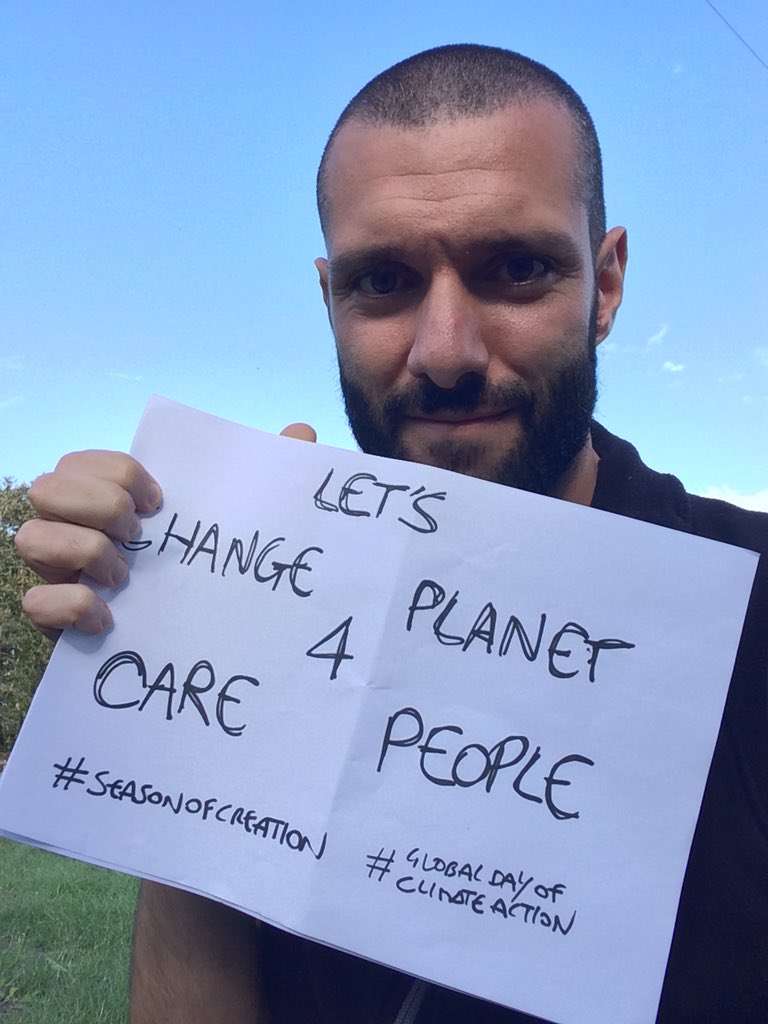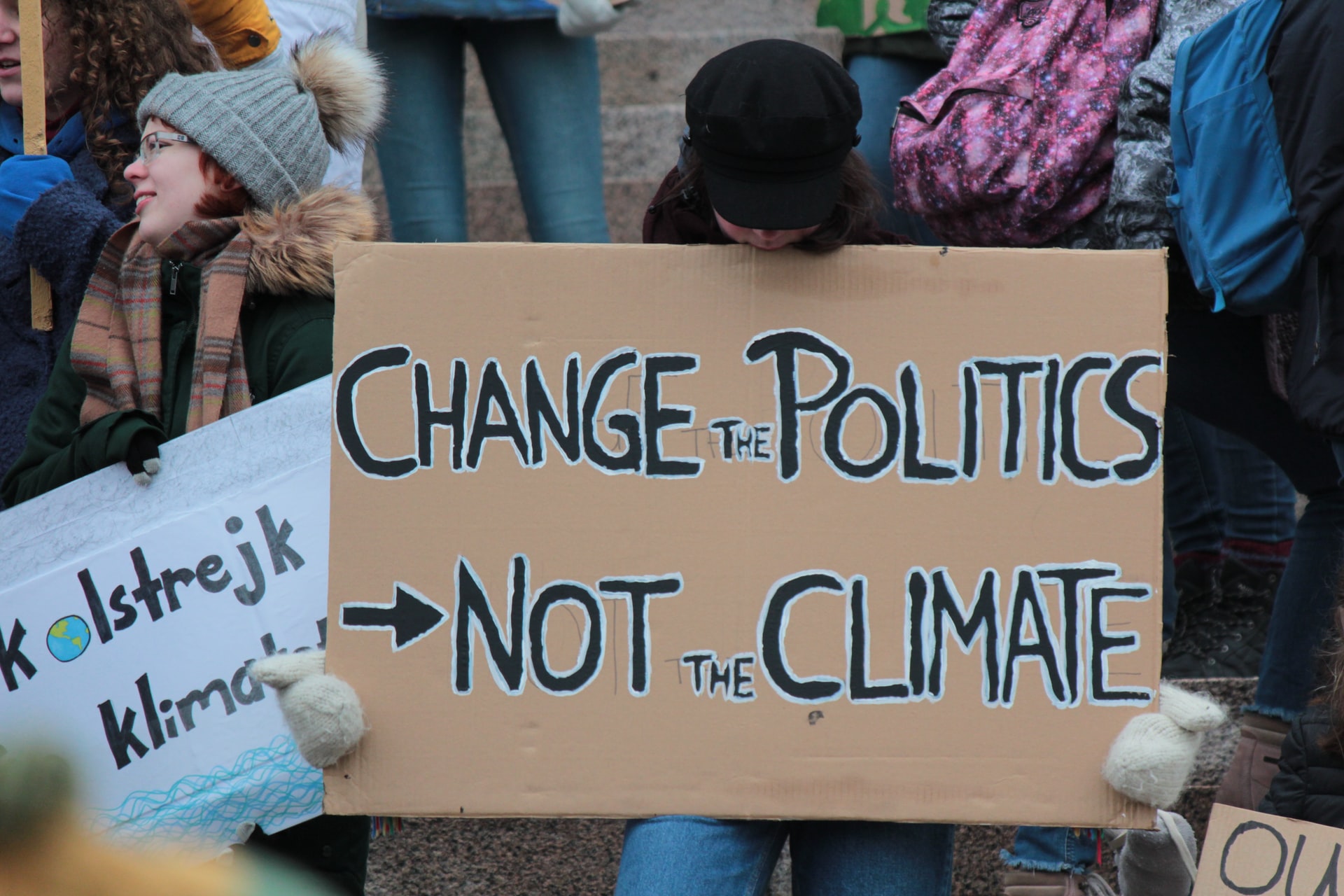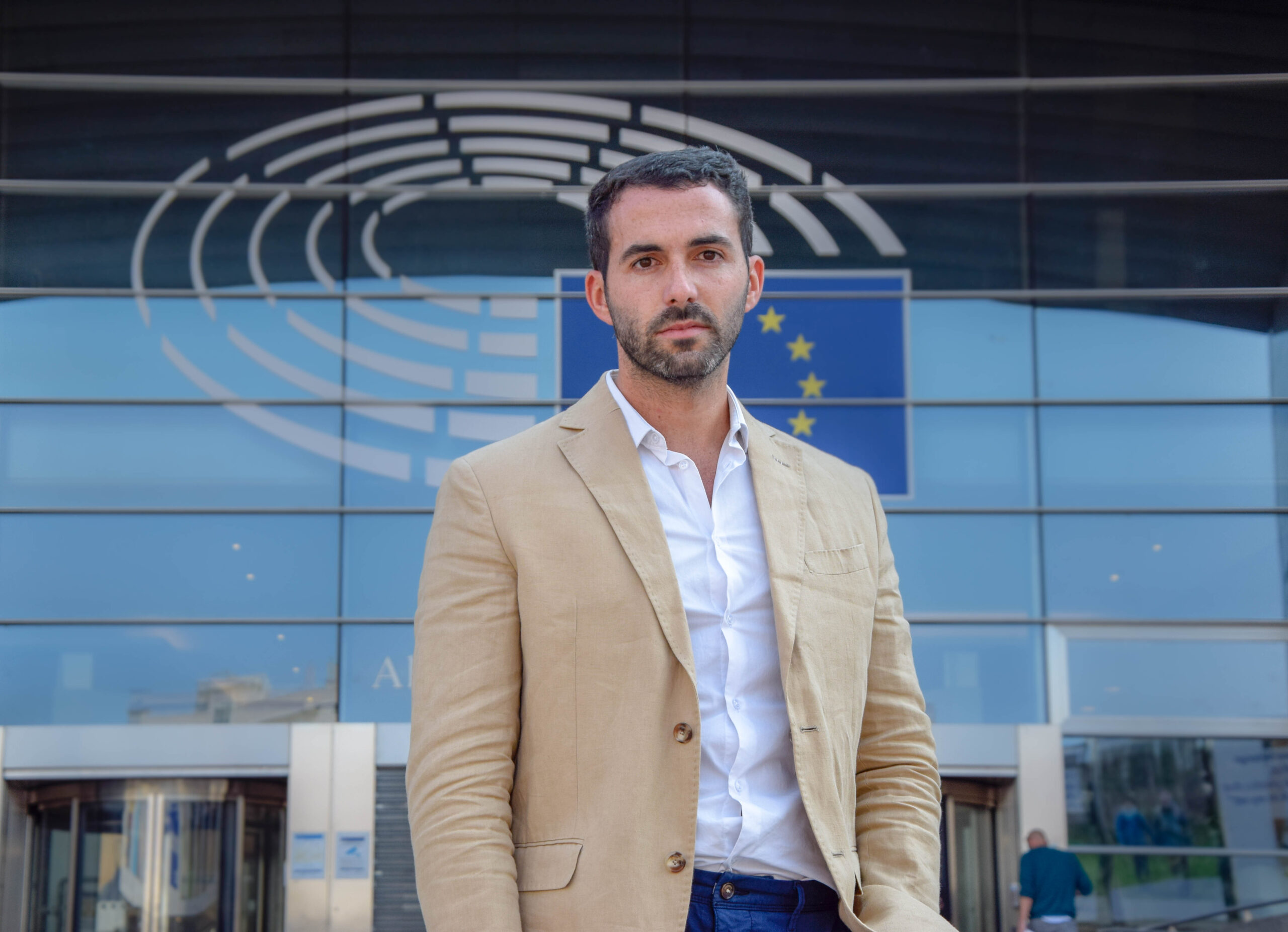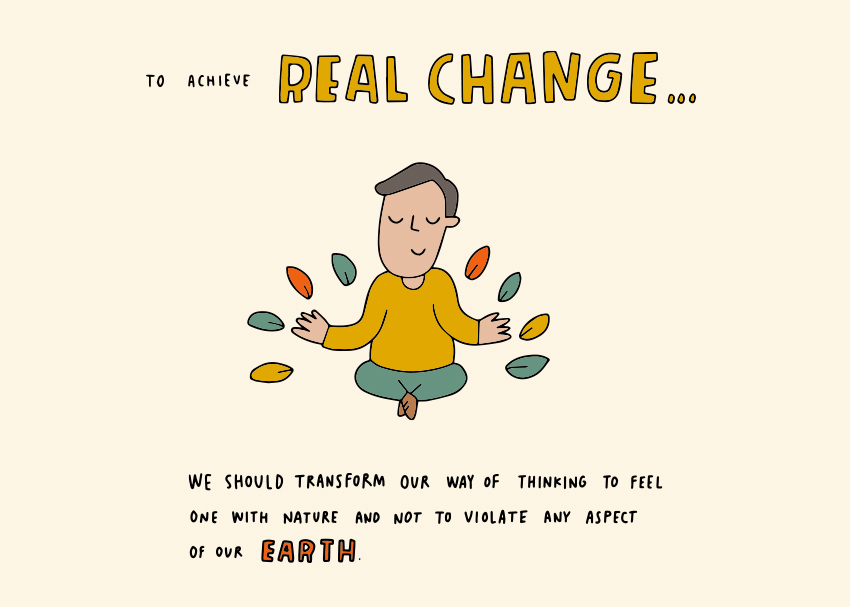Meeting our Eco-friends:
Campaign Project Officer at CIDSE, Giorgio Gotra joins us to discuss the global situation of the youth and the intersection between ecology and socio-economic inclusion across generations. Dive into the challenges facing young people, their inspiration and their potential to shape our future in Europe and beyond at this month’s edition of the story.
1. Who is Giorgio Gotra? Tell us a bit about your background. What that made you join CIDSE?

I think I can explain who I am through three simple objects. The first one is my cycling helmet – since I moved to Brussels, I am a committed cyclist, I cycle every day, no matter what. The next is my personal agenda. I like to take notes and write everything down. My last item is a magazine. I am a very curious person who likes to dive and be updated on everything that is happening around the globe.
Replying to your questions on a more conventional format… I am a 31 years old northern Italian with a background in political science and international cooperation who moved to Brussels 4 years ago.
Before moving to Belgium, I was based in Ethiopia, in a southern region of Addis Ababa, working on a project supporting small-scale family farming: for me a great experience on the field where I could directly see the results of our work. However, after a while, I applied for an internship at CIDSE because I missed the bigger political and cultural frame of cooperation and engagement, particularly at the European and international layer.
Building a career around international cooperation, development and social justice had always been my biggest dream, and this matched what I wanted since I was a university student. At first, my aim was to work for the Italian branch of CIDSE (FOCSIV), but an internship opportunity came out for CIDSE in Brussels and, despite enjoying work close to the beneficiaries in the Ethiopian countryside, I went for it and got it. I remember the day of the interview very well because a few hours before the videocall, a blackout happened and I had to communicate with CIDSE recruiters by phone -finding a creative solution- and by fax.
2. What is your current role at CIDSE? Could you introduce us to the work of CIDSE in the field of Youth and Ecology?
Currently I work as a campaign project officer, coordinating several actions and initiatives around the themes of ecology and youth. The main project I am responsible for is called “Change for the Planet, Care for the People” which was launched in 2015 initially as a campaign but which later became a permanent initiative. That time was the year when COP21 took place, the year in which the UN SDGs were officially launched and also the year in which the encyclical Laudato Si was published – these events were a huge boost for the campaign launching, and today we are still benefitting from that same energy.
In a few words, the “Change for the Planet, Care for the People” project consists of a shared journey towards sustainability to achieve social and climate justice having youth (from our member organisations) as protagonist. This journey takes the form of international camps, retreats, mobilizations during conferences on climate change and a great variety of other types of events.
I think that a sign of its success and the interest it generated can be the core of this project, which was first conceived as a temporary campaign, but it has already been going on for 6 years.
While most of our members’ organizations are based in Europe and in North America, we connect and we foster participation globally. Connecting with people in the global south is very important for us, not for international sustainable camps or during and mobilisation at big conferences only but all over the process journey. In this regard, the online format imposed by the pandemic enabled us to get closer with some our friends and colleagues based in the global south, and to better liaise with activists from faith and non-faith backgrounds. In this same line, we are now launching a new common journey to COP 26. The idea is to bring 100 young people to Glasgow during the negotiations (if Covid allows), and to have activities on site where activists can be equipped with the right tools and knowledge on the main topics of our mobilization. In order to prepare the group young activists, we’re organizing webinars and trainings, to have youth familiarizing with the negotiations wording, but also to know about the role of faith-based organizations in the process.
Beyond the pure activism, this project is about the promotion of more sustainable lifestyles too. We are aware about the importance of the policy dimension but we also see the need to inspire and promote action and solutions from individuals and communities. From energy consumption to transportation, food production technology… our individual decisions still play a role, and we need to promote alternatives coming from all over the world.
In this sense, we like to follow the vision of the encyclical Laudato Si and focus on consciousness building. In Laudato Si language, we apply the “see-judge-act-celebrate” approach, facilitating and encouraging inspiration coming from ordinary people like us. This applies not only to organisations, but also to families, groups of friends, informal groups etc.
3. Inter-generational inequality is back. 70 years ago, this reflected the result of booming progress, a society which left behind a pre-industrial normal. Today, it reflects the depletion of opportunity. As a member of the millennial cohort yourself, what has been your reaction to this broken promise?
I think we should first rethink the meaning of this idea of incremental progress. It is impossible to deny this intergenerational inequality and its devastating effects, but it is also true that sometimes we address this question solely through the prism of consumption and consumerism. I grew up listening to the motto of “leaving the word better than as you found it”, but I am not sure if it has been properly applied in our recent past. Of course this is not meant to lecture of blame anyone, but change in a way should have taken off before.
Those born in the 50s or 60s saw the arrival of the fridge and the personal cars, they grew up in a culture where the concept of a successful life soon revolved around greater access to material wealth – a culture detached from the environmental reality.
On this, I think we should start a serious dialogue articulated around constructive listening and not blaming. We should try to avoid reproducing what brought us here, and think of long term solutions which will work for us all. In a way, this same logic also applies to international inequality – we should truly re-envision what a developed economy truly is. The human being shall not be at the top of the pyramid, but within our ecosystem’s boundaries.
4. Since the future of our planet is currently at stake, ecology has also played a fundamental role in this inter-generational conversation. Do you feel your generation (and those who arrived since) will constitute a breaking point for the current system?
Well, I think this is very hard to predict, particularly from our limited Eurocentric perspective. The world in 2050 will be very different to what it is today, especially demographically. That being said, I see a lot of young people really committed, especially thanks to the “green waves” and the related student movements. The next decade will be particularly critical. Scientists confirm us that the margin is closing and, during this time, we will see how the maturing of current youth will affect political environments and perspectives across the globe. I really hope that a shared global duty or mission will emerge from this. Something which could boost cooperation and decisive action. On this, I am quite optimistic.
5. Would you extend this break-up to current cultural norms and the phenomenon of consumerist identity too? Has this started already?
I really think so, and I have been truly impressed by what European young people are achieving in this area. Starting from a very small scale, student organisations have pushed for the banning of plastics within their academic context, and a culture built around reducing meat consumption and air travel is growing in intensity. Together with this, we have witnessed how young people are pioneering in practises of a circular economy – from swapping and reselling clothes to car-pooling. I can definitely see a reprioritization of needs and values, but we should not fall either for the green-washing of what can be better explained by precarity and growing poverty.
Overall, I think this is also, to a great extent, the first results of shifting perspectives within education. I am happy to see how much our advocacy work and discussions are now embedded in schools, and how NGOs and faith-based organisations work in the same direction. In this sense, I am optimistic (yes, once again). Together with this, I also see how the current pandemic could further impulse this trend and make us more conscious of our impact on nature.
Did you remember the short-term consequences of the first lockdown? Waters have become clear again, people were able to listen to birds from their window of their apartments, less pollution everywhere – something we were not able to notice before.
6. Have the youth’s socio-economic tragedy and a lethal global health crisis shown us that a different reality is possible? Do you see a silver lining within these two catastrophes?
Yes, I am one of those thinking that from the worst moments can bring the best out people. I remember when I did my Erasmus in Spain in 2010 I had the opportunity to meet a lot of Greek students. As we know, the financial crisis hit Greece particularly hard and they offered me an insight into how people had reacted on a grassroot level. They told me how people started pooling the little they had available – one would bring the pasta, another person would bring the gas for cooking, people would invite each other for dinner or lunch when in need etc. It was a back to the commons and no one was excluded.
With the pandemic, I have seen something similar happening in Italy (and surely all over Europe). It has become increasingly common to see baskets in the streets with a “if you have leave it, if you need it take it” written on them.
Covid has also spurred waves of solidarity, and it’s not just churches acting this way, but ordinary people too. We should try to preserve this sense of solidarity into the future and, in a way, these have been opportunities to reconnect with humanity. So yes, to your question, I think catastrophes have provided us with the right conditions to rethink ourselves. The hard part then is how to keep that “best form of us” and make it the normality.
7. Politically, for multiple reasons, the youth today have demonstrated marginal power in shaping reality. Can the youth afford to just “wait for their turn”?
I believe the youth’s influence might not be visible today, but it will become apparent very soon. It is true that a lot of young people are struggling today, and I can’t even imagine the full range of social and psychological consequences that this pandemic will have on them. But, even under the conditions of hardship, we have seen things get moving. Last year, for example, I was impressed by how these young people through TikTok created a huge campaign against Donald Trump which stormed the US political conversation. Recently, we have also witnessed huge demonstrations led by youth on climate, so, perhaps, they do have some power, but this is channelled through means of communication and influence that might render them less visible to the public eye.
In this topic, and for this reason, I am strong supporter of the voting age to be lowered to 16. People at this age are already well aware of our reality, and decisions taken today not only address the present, but also condition the future – their future. Because of this, they should be listened and, in an ideal scenario, they should participate and get more involved.
Together with this, if we want to make this opening truly inclusive, we should also aim at breaking the jail of struggle that many times impedes the youth’s political development. Here I am talking about sky-rocketing rent, job precarity etc. But this, perhaps, leans into a different discussion.
8. In your opinion, could the European project become a testbed for the transformative potential of the current youth?
Yes, my answer to this is a highly convinced yes, and I am a person who strongly believes in the European project and in the European Union. I think the EU is already investing heavily on the youth and, in a way, I am a product of that investment. I’m part of this vision and, as a millennial myself, I benefited substantially from programs like the European Voluntary Service or university semesters’ exchanges.

On this, I should also bring up the importance of, for example, the Erasmus Plus Platform in empowering the European youth. I can see how, through the multiannual financial framework, the EU Commission has invested more and more in this program and I think we should spend more effort in demystifying this initiative as a party-filled semester away – it is much more than that. If there is one area in which the British Government has faced particularly intense protests with Brexit it has been education. UK students valued the Erasmus Plus project, and this is a good testimony of its success and importance within the European context.
9. Would you say then that there is a natural alignment between an EU Commission who understands the comparatively Europhile identity of new generations and the interests of the youth?
Well, I really hope so. Today I can see efforts being directed towards the digital, the green and the youth, and this is definitely the right direction. Then, of course, we would need to impulse this vision not just from the institutional and the managerial bodies, but also as active citizens: ensure transparency, efficacy with available resources and evaluate the results.
Perhaps, if I had to mention something which I see particularly lacking and which should be worked on, I would point out to cohesion policy – the practical implementation of the idea that no one should be left behind.
We have seen worrisome gaps emerging between the European core and the periphery which had a profound and disproportionate impact on youth. The resources to solve this are there, but the current political environment between EU Member States and certain implementation caveats stand between us and a successful resolution of this problem.
10. What would be your advice for EU institutions for conjugating the rescuing of these “lost generations” with the imperatives of environmental sustainability?
Committing financial resources to this end is always a good start, especially when it comes to the addressing the excluded and those fewer opportunities. I don’t work with EU institutions, and I wouldn’t be necessarily comfortable to work in this environment but, despite that, I am certain the European project can only be successful by becoming really welcoming participatory and applying solidarity – inclusiveness should be implemented at local, national and regional policy-making.
On this, I also think we should be braver and celebrate more what has demonstrated to be successful. 30 years ago, it was very brave to launch something like the Erasmus project – and you can now see the impact it has had within the European youth. I also believe events such as European elections should be the place to make statements like these clear and to express what Europe means for the youth. Yes, bureaucracy and corruption stall progress, but active participation is the only way to overcome the stalemate.
11. Would you say then that the recipe to solving the current conundrums in the socio economical field and ecology is more democracy?
I do believe so. Participation starts from our neighbourhoods, from our towns and then scaling up. Democracy, inclusion and solidarity – these are the values I attribute to the idea of Europe and the ones that every day guide my professional and personal life.
Thank you very much for providing us all with a very valuable insight, and thank you for accepting our invitation to participate in our series.

Interview by Telmo Olascoaga
JESC Junior Ecology Officer




